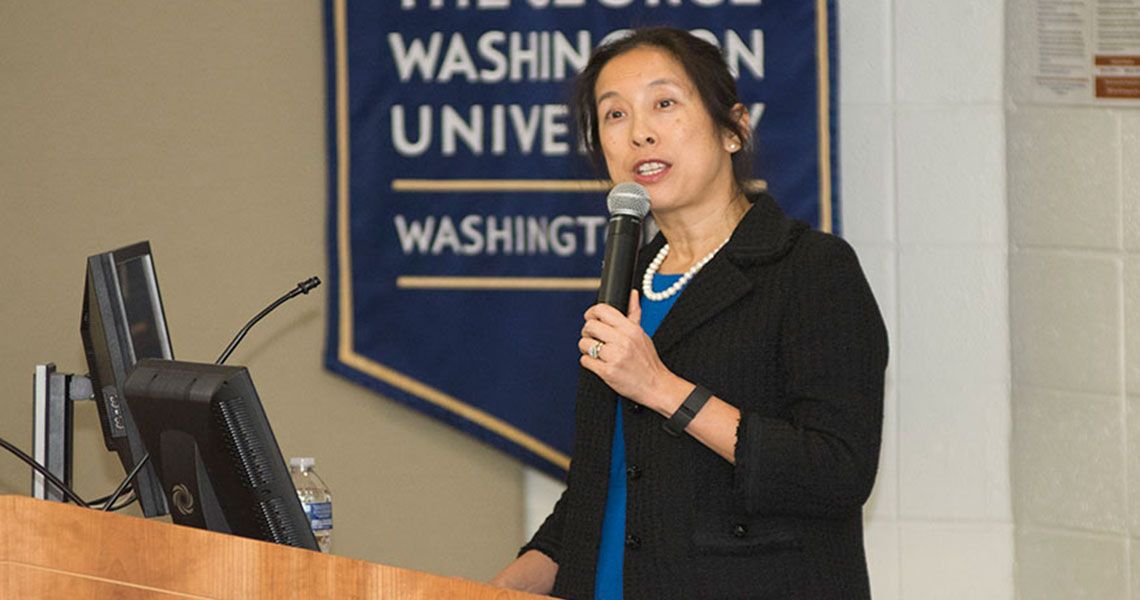There’s a parable by the late author David Foster Wallace that encapsulates the Stuart M. Fidler, M.D., Memorial Lecture series: Considering the human aspect of medicine. Surgeon and New York Times columnist Pauline W. Chen, M.D., addressing GW School of Medicine and Health Sciences’ (SMHS) students at the annual event, recounts the tale: Young fish are swimming in a river and come across an older fish. He says to them “Morning, boys. How’s the water?” The young fish swim on, but after some time one asks “What the heck is water?”
This parable, Chen said, is about being aware. “I love that the Fidler family and GW ask us every year at this lecture to stop and contemplate the very human waters of medicine,” she said. “I am incredibly honored to be here and be asked to serve as an ‘old fish.’”
The Fidler family started the lecture series in 2005 after the passing of Stuart M. Fidler, M.D., a clinical professor of medicine at SMHS. “Dr. Fidler was a superb physician. He was knowledgeable, conscientious, and compassionate,” said Robert Wilkinson, M.D., M.A.C.P., Professor Emeritus of Clinical Medicine at SMHS, before introducing Jane Fidler, Stuart’s wife.
Jane thanked Chen, who specializes in liver and kidney transplants and the treatment of cancer, for accepting the invitation to speak for a second time; Chen also was a lecturer in 2010.
In remembering her husband, Jane referred to the words of musicians John Lennon and Paul McCartney: All you need is love. “That’s what Stu did,” she said. “He loved to practice medicine, and he was really good at it.”
Chen’s book, “Final Exam: A Surgeon’s Reflections on Mortality,” was assigned to first-year medical students at GW over the summer. The lecture series, over the past few years, has made a point to tie the speaker to the students’ summer reading, which often touches on the human aspect of being or becoming a physician. The lecture offers a unique opportunity for students to hear from and meet the author of a book that they have read and discussed with faculty.
Chen centered her talk on an extraordinary woman and surgeon named Mary Amanda Dixon Jones.
Dixon Jones was a leading surgeon in the late 1880s, and the first in the United States to perform a successful hysterectomy; in 1888 she removed a 17-pound uterine tumor. “She’s a doctor whose innovations and approach to medicine predicted the future of surgery, and a woman who never forgot the human side of her most vulnerable patients,” Chen said.
However, at that time it was unthinkable that a woman would pursue a career as a gynecological surgeon, Chen said. Despite her work and commitment to her patients, Dixon Jones was persecuted for what Chen called “conduct unbecoming.” In the early 1890s, New York newspaper The Eagle published lurid articles accusing Dixon Jones of moral corruption. The features led to two manslaughter charges and eight malpractice suits against her. Ultimately, Dixon Jones was cleared of all charges and later sued the newspaper for libel. It’s a case she lost.
The lesson taught by the hard work and perseverance of Dixon Jones is not limited to the 1800s. Her story matters today, Chen said, because today’s generation of medical students also faces difficult challenges.
“We still live in a time when doing the right thing, being a humanistic practitioner of medicine, often means persisting in the face of overwhelming odds and engaging in conduct unbecoming,” Chen said.
But Dixon Jones remains a beacon of hope, she added, “for those among us who care deeply for patients, for colleagues, and about health care.”



